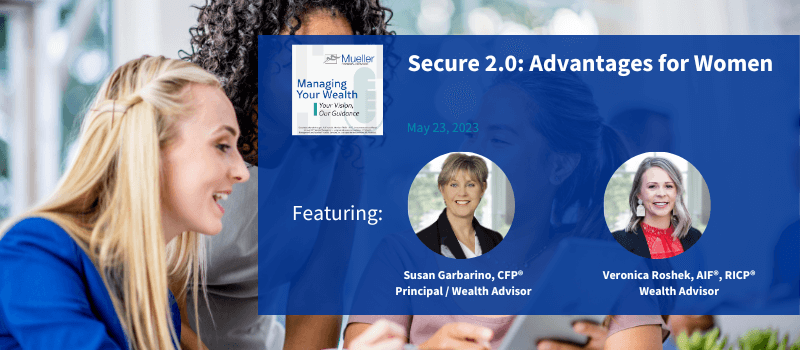
Secure 2.0: Advantages for Women
By Mueller Financial Services, May 23, 2023
Join Susan Garbarino, Principal / Wealth Advisor, and Veronica Roshek, Wealth Advisor, as they discuss the advantages of the Secure 2.0 Act for women. Mueller Financial Services’ team of dedicated professionals is passionate about helping women pursue their goals by educating, empowering, and inspiring them to make wise financial decisions for themselves and their families.
For more information, please contact:
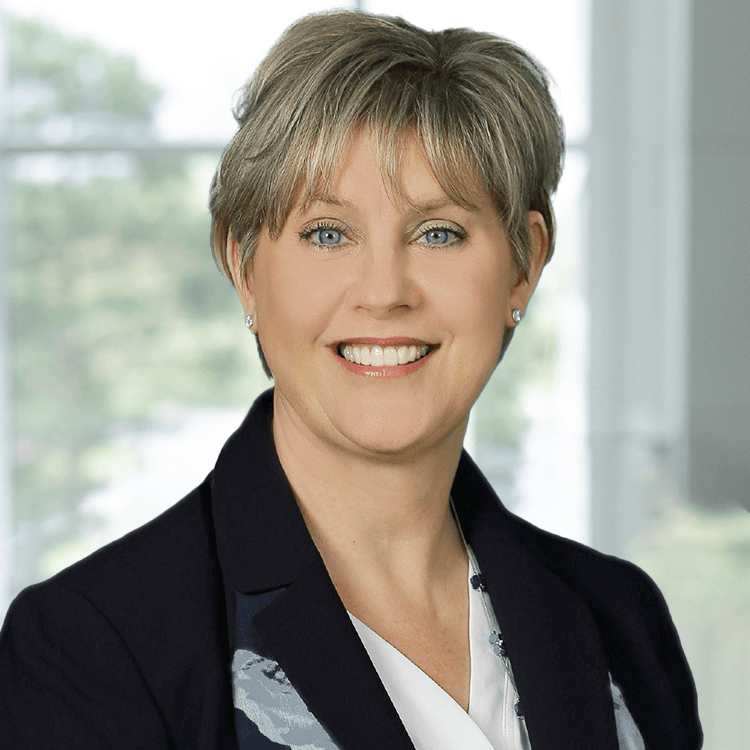
Susan Garbarino, CFP®
Principal / Wealth Advisor
sgarbarino@muellersolutions.com
847.649.8817
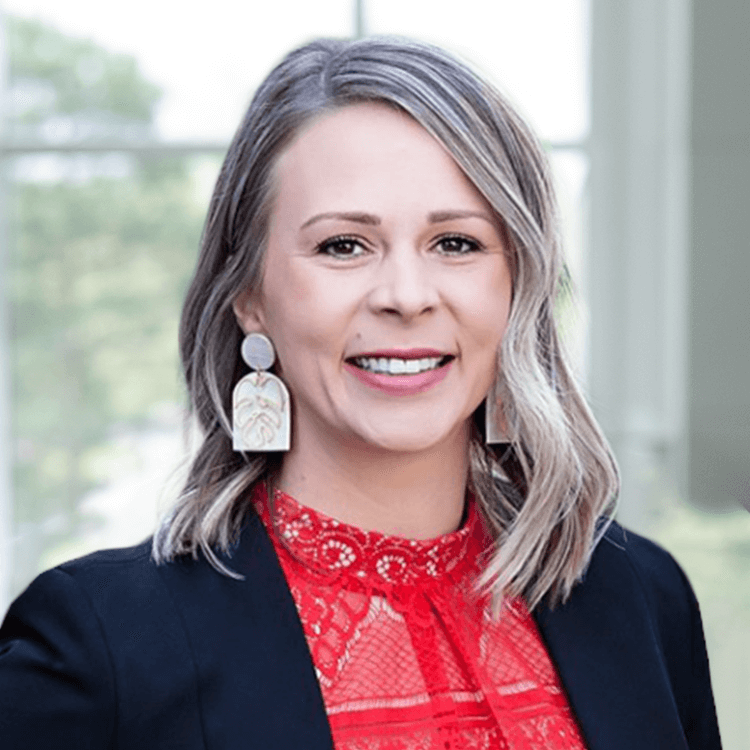
Veronica Roshek, AIF®, RICP®
Wealth Advisor
vroshek@muellersolutions.com
941.271.7182
Episode Transcript:
[00:00:00] Ashley: Hi everyone, you’re listening to “Managing Your Wealth: Your Vision, Our Guidance,” the Mueller Financial Services Inc. podcast. I’m Ashley, and today I’m with Wealth Advisors, Susan Garbarino and Veronica Roshek to talk about advantages of the Secure 2.0 Act for Women. But before we get into this topic, let’s do a quick introduction.
[00:00:29] Ashley: Sue is a CERTIFIED FINANCIAL PLANNER™ professional with over 25 years of financial services experience. She works with clients in preparing strategies to help them work towards a successful outcome in their financial and insurance goals, especially after significant life events and transitions. Specifically, Sue developed our planning for Women’s Service Line, a way to help women pursue their goals by educating, empowering, and inspiring them to make wise financial decisions for themselves and their families.
[00:00:56] Ashley: Veronica is an Accredited Investment Fiduciary®, and Retirement Income Certified Professional® with over five years of experience working in the financial services industry, along with a lifetime of experience growing up as a daughter of a financial advisor. Rooted in a passion for education, veronica thrives on empowering business Owner’s and individuals with tools to gain clarity and build direction for their financial picture.
[00:01:20] Ashley: Sue and Veronica, thank you so much for joining us on the podcast today.
[00:01:23] Sue: Thank you for having us.
[00:01:25] Veronica: Yeah, we really appreciate it.
[00:01:27] Ashley: To get started, can you please give us a brief introduction to what the Secure Act is?
[00:01:32] Veronica: Absolutely. So in late 2022, Congress passed Secure 2.0 Act. This is something that builds upon original legislation that came out in 2019, which was the original Secure Act.
[00:01:49] Veronica: Secure stands for Setting Every Community Up for Retirement Enhancement . So really the goal of this is to expand access to retirement plans, promote participation, and preserve savings of all Americans. The additional legislation that was added at the end of 2022, just builds upon these same principles to really make sure that we are giving people access to the correct tools to be prepared for retirement.
[00:02:19] Veronica: Some of the changes that took place in this act are gonna come into place right away right now, in 2023, but there’s many more adjustments that are going to be phased in over the next few years as well.
[00:02:32] Ashley: How does Secure 2.0 Act specifically impact women?
[00:02:36] Sue: Well, while many of the provisions in Secure Act 2.0 benefit all Americans, we think women have the potential to reap the most benefit from the changes in the Act because of the unique challenges that they face going into retirement.
[00:02:50] Veronica: Yeah, that’s so true. There’s so many different things that women have to deal with, that just set them apart a little bit from the average American in general, that’s saving for retirement.
[00:03:05] Ashley: Before you get into the details of how Secure 2.0 is a benefit, what are some challenges that women face financially?
[00:03:11] Sue: I can answer that. I think the number one challenge that women face financially is the fact that they typically have longer lifespans than men. So they really need to save more in order to cover those extra years in retirement, as well as those extended healthcare costs that will all face as we reach those later years in retirement.
[00:03:32] Sue: The second challenge that women face is that they typically take breaks from work to take care of children, and then again later in life to take care of parents. According to Goldman Sachs research, just four year periods out of the workforce, perhaps one for childcare and another for elder care, can reduce a woman’s retirement savings by as much as 35%.
[00:03:57] Veronica: Wow.
[00:03:57] Sue: Yeah, just taking a couple breaks really has a huge impact. The third challenge that women face is the disparity in pay between men and women. And while women have made great strides in closing this gap, the pay gap still results in women not being able to save as much and having fewer assets than men going into retirement. It’s just kind of a, a fact of life right now.
[00:04:21] Veronica: Yeah, COVID certainly didn’t help with that either having women trying to balance all of those things at the same time and potentially going part-time and trying to flex all of that all together. They seem to take on more of that burden in the household.
[00:04:39] Ashley: What are some of the advantages to women specifically?
[00:04:41] Veronica: Yeah, Ashley, there’s a ton of benefits, actually, but there’s a few that I know we want to highlight that are just primarily even more so an advantage to women.
[00:04:55] Veronica: The first one that I wanna bring up is that it encourages the ability for people to have access to emergency savings in general. There’s a provision that got added where you can withdraw penalty free up to a thousand dollars out of your retirement plan so, this could be a 401k, it could be a different retirement plan entity that’s available through your employer. You would have to claim a reason for why you could take that a thousand dollars out without penalty.
[00:05:24] Veronica: Some of the things that apply are terminal illness, domestic violence, or anything that you deem yourself to be an emergency. It’s just a thousand dollars that can be withdrawn, penalty free to you. You would still pay taxes on that if you had saved them tax deferred in the first place. But this is a big advantage because right now, typically in general, if you withdraw anything out of your retirement plan before age 59 and a half, there’s a 10% penalty that is added on to any taxation that needs to apply to those benefits.
[00:05:57] Veronica: We, of course, do encourage people to have emergency savings outside of their retirement plan, so it’s highly recommended that you’re saving in both methods so that you don’t have to access your retirement. But it’s great to have this flexible benefit for those unexpected things that come up.
[00:06:16] Veronica: Another benefit that certainly applies is that starting in next year in 2024, You can actually be qualify for saving for retirement by just making payments to your student loans.
[00:06:32] Veronica: If you’ve got an excessive amount of student loans and you really wanna get that down and you’re trying to figure out how to balance paying off a student loan and also saving for retirement at the same time. That can be really hard for people to navigate doing everything all at once. So, starting next year, you can actually self-certify that you are paying off student loans to your employer, and that can count as your 401k savings so that you can get a match from your employer, even though part of your paycheck isn’t going into your retirement. So you’re gonna be able to still start saving inside of that retirement account, and not miss those years while you’re also trying to get out of debt.
[00:07:16] Veronica: A third provision that is really helpful for women is as newer, maybe smaller employers, new businesses that are putting in place for new retirement plans, starting in the year 2025, those new plans that employees will automatically get enrolled to be saving at least 3%, and then on an annualized basis it will auto increase their savings all the way up to 10%. This is something that each employee can always go into their own plan and they can bump up or bump down that savings amount. But if you don’t do anything at all yourself, you would automatically be working towards a really good savings goal to help yourself be prepared for retirement.
[00:08:06] Veronica: In general, we tend to tell people that having a goal of saving between 10 to 15% into your retirement account is a really good place to be to reach your financial goals. But, that exact percentage of course depends on your overall financial picture.
[00:08:24] Sue: I really like the advantage that you mentioned about the student loan payments, counting as 401(k) contributions in order to qualify for a match because that is always a competing priority. Do I pay down debt or do I save in my retirement account?
[00:08:42] Sue: So this is bringing the best of both to the table and giving especially those younger savers a way to get the match at the same time that they’re paying down their student loan .
[00:08:54] Sue: I’ve got a few more advantages that I’d like to cover as well. One of those being that, especially for women, that they’re changing the age that we need to begin taking required minimum distributions.
[00:09:06] Sue: So, this year the age was increased to age 73, and in 2033 it increases to age 75. So this is great because it allows us to keep our assets growing in tax deferred accounts for a longer period of time. Which hopefully is gonna result in a bigger nest egg for all of us to live on in retirement.
[00:09:29] Sue: Another advantage is that the Secure Act 2.0 is also increasing the catch up contributions in retirement savings beginning in 2025 for employees who are age 60 to 63. At that point, you’ll be able to contribute 150% of the typical catch up contribution, or $10,000, whichever is greater. This gives everyone a chance to boost their savings as they’re getting closer to retirement. So that’s another huge one.
[00:10:01] Sue: Another advantage is starting in 2025 employers have to make their 401K plans available to their long-term part-time workers. And according to the US Department of Labor, 64% of part-time workers are women. So having access to retirement plan savings accounts will be a great benefit for those women who work part-time and who up to this point really haven’t had any access to retirement savings plans.
[00:10:31] Veronica: Yeah, all of those really target women. The one about required minimum distributions, backing up women live longer. So being able to have those assets last a longer period of time I know is something that’s a lot of women worry about, making sure that they don’t outlive their money. Having the update to be able to have those additional catch up contributions and have that flexibility for those reasons you were pointing out earlier, Sue, about how women tend to have more breaks for childcare or caring for parents, or any of those scenarios. That really gives them some help with that flexibility.
[00:11:12] Sue: Well, and I love that the part-time workers are going to get access to these plans, which then gives them access to employer match, which is free money, and that all helps to build your savings as well.
[00:11:23] Veronica: Absolutely.
[00:11:25] Ashley: That’s all great. What is something women can do today to start taking advantage of these changes?
[00:11:31] Veronica: Yeah, so the first thing we would definitely recommend would be that you just get educated on all the resources that are available to you as an individual. So if you work for a company or a small business, really get educated on what is available to you, even if you think you already have a good understanding of it.
[00:11:52] Veronica: It’s never a bad idea to go ahead and talk to your person that works in HR to get a good overview of what all your benefits are, how your retirement plan works, and just anything that you have access to in that arena, and make sure that you’re taking advantage of everything that you possibly can.
[00:12:10] Veronica: If you don’t work for a company, maybe you are a business owner yourself, and in that scenario, same thing. But instead of, you know, going to your HR, maybe you’re out overlooking your business plan and everything that you have set up and making sure that you are covering everything that you want to make sure you’re able to for both yourself and your employees. Because there’s also some additional provisions of Secure Act 2.0 that really help small business owner’s to increase different methods of savings for their employees and themselves and give some breaks.
[00:12:47] Veronica: So in addition to that related to your employer, it’s always a good idea to do an overview and to just do a checkup on your financial picture. Things like if you have student loans, knowing maybe what your interest rates are there and having a good understanding of how you could be taking advantage of these changes that are upcoming and looking at your overall cash flow and just trying to take the best advantage you can to be prepared for retirement and have a good financial picture.
[00:13:17] Sue: Yeah, I would say also it’s really important for women to have a financial plan, you can never be too young to start this planning process.
[00:13:28] Sue: It’s so important for women to know how much they’ll need in assets in order to retire and to feel confident that they’re not going to outlive their assets. It’s really also critical to know the risks that can derail your plan as you get closer to retirement. For example, if unfortunately there’s a premature death of your spouse or your partner, how does that affect the outcome of your plan?
[00:13:52] Sue: So we really encourage everyone to go through a planning process and know what it’s gonna take to get to that ultimate goal of retirement. And we cover all of these areas in our financial planning process. We really encourage women to go through this planning process so that they can feel confident and secure in their financial future.
[00:14:15] Veronica: Absolutely. If you’ve never started before, it would be a great thing to just go ahead and reach out to someone and try to get some help with establishing that financial plan. If you need any help or assistance with anything in that capacity related to financial planning, we are more than happy to be a resource to you and to give any more information about Secure Act 2.0.
[00:14:44] Ashley: Well, I just wanna thank you guys one more time for joining us on the podcast today. It was a great overview of the advantages of the Secure 2.0 Act for Women.
[00:14:52] Ashley: Thank you, Ashley.
[00:14:53] Ashley: We appreciate you having us. Thank you, Ashley.
[00:14:56] Ashley: And thank you for listening. If you’re interested in learning more about the Secure 2.0 Act, planning for women, or more about Mueller Financial Services in general, visit muellerfinancialsolutions.com. You can also follow the firm on LinkedIn at Mueller Financial Services, Inc. for more firm updates, insights, and upcoming events.
[00:15:15] Ashley: Securities offered through LPL Financial member FINRA / SIPC. Investment advice offered through IHT Wealth Management, a registered investment advisor. IHT Wealth Management, and Mueller Financial Services Inc. are separate entities from LPL Financial.
[00:15:31] Ashley: The opinions voice in this podcast are for general information only and are not intended to provide specific advice or recommendations for any individual. To determine which strategies or investments may be suitable for you consult the appropriate qualified professional prior to making a decision.
Related Insights
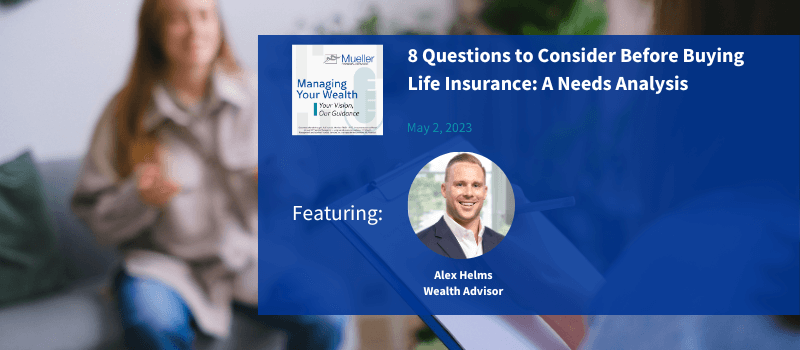
May 2, 2023
Podcast: 8 Questions to Consider Before Buying Life Insurance – A Needs Analysis
ShareMay 2, is Life Insurance Day, and marks the anniversary of the first day that life insurance became available in …
Read More navigate_next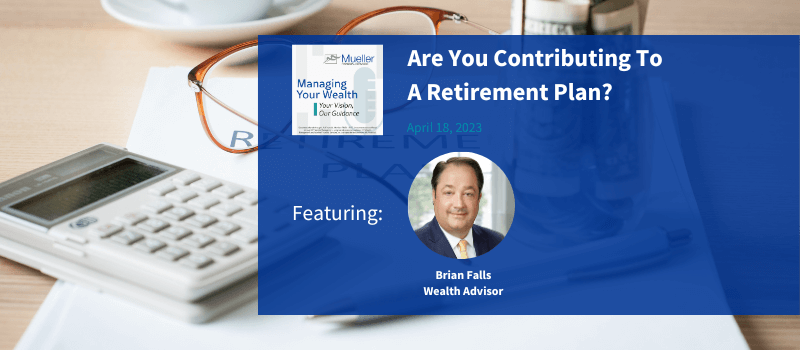
April 18, 2023
Podcast: Are You Contributing To A Retirement Plan?
ShareJoin Wealth Advisor, Brian Falls, as he discusses considerations for contributing to a retirement plan. Mueller Financial Services can assist …
Read More navigate_next